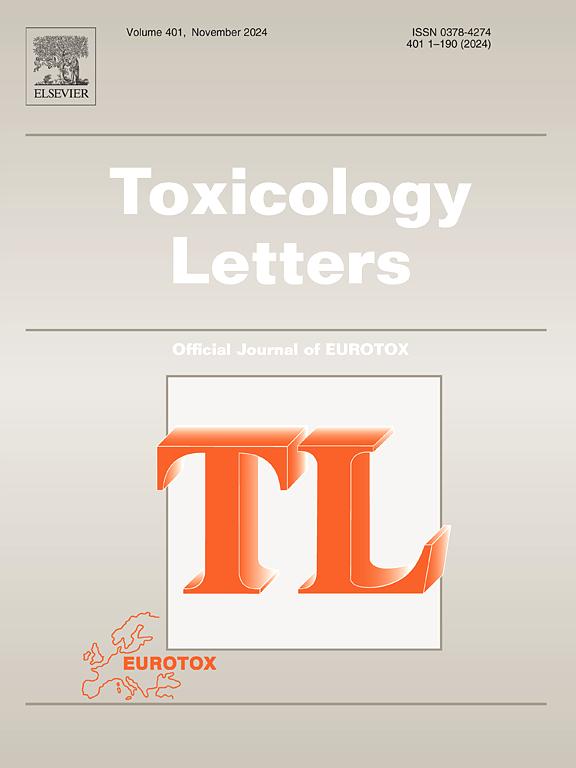CEC04-03 Tools to assess the quality of of kinetic publications
IF 2.9
3区 医学
Q2 TOXICOLOGY
引用次数: 0
Abstract
Assessment of the quality of studies is an important step when reviewing publications. Concerning reviewing studies, a long tradition exists in the medical field with the Cochrane Reviews which started in 1993 when the Cochrane Collaboration Group was built. The focus of Cochrane reviews is on efficacy of medicines, therapeutic interventions and diagnostic procedures by performing systematic reviews. The collaboration group developed methodologies for systematic reviews, among tools to assess the “quality” of a study, and they are developed further until today.
Quality assessment (called also: critical appraisal, and risk of bias assessment) refers to the assessment of the methodological quality of a study, on which the confidence in the results of the study is based.
The principles of assessing the methodological quality of a study have extended to further fields, e.g. in toxicology where systematic reviews are performed to assess the safety of a substance in current use e.g. as a food additive.
The tools which were developed are primarily meant and applicable for the assessment of effect studies in humans and also animals, particularly the integration of both streams of evidence (Hannes et al., 2020; NTP OHAT, 2019).
Soliman et al. 2022 have published an inventory of quality markers which can be used to evaluate pharmacokinetic studies in humans. However, unfortunately, until today no appraisal tools are published which can be used for animal studies. No tools are also available in Guidelines addressing aspects of kinetic studies of OECD and ICH.
Thus, our group, a WG in the German Society of Toxicology, started to develop a tool suitable for assessing the quality of animal toxicokinetic studies.
The tool contains elements of quality assessment as in other tools, however adjusted to the aim to assessing toxicokinetic studies. The sections of the tool cover Study Design and Planning, Study Performance, Animal Housing and Feeding Conditions, Sample Collection and Chemical Analysis, Toxicokinetic Analysis and Data Reporting, and an Overall Evaluation. Every section is covered by several questions (sub-items) for which grades have to be given (3 for acceptable without restrictions, 2 for acceptable with restrictions, and 1 for existing with major flaws or not existing). Not applicable is also foreseen if the question is not relevant in the context of the study. The questions are given different weights, depending on their importance between 4 and 1. The final evaluation is performed by adding up the points (grades x weight), resulting in a final sum. The sum is related to the sum which could be reached if all questions were assessed as acceptable without restrictions. The percentage of the theoretical maximum score can be used as a benchmark for assessing the quality of the study and the confidence which can be given to the results.
动态出版物质量评估工具
评估研究的质量是审查出版物的重要步骤。关于综述研究,在医学领域有一个悠久的传统,从1993年Cochrane协作小组成立开始,Cochrane综述就开始了。Cochrane综述的重点是通过进行系统综述,对药物、治疗干预和诊断程序的疗效进行评价。该合作小组开发了系统审查的方法,其中包括评估研究“质量”的工具,并且这些方法得到了进一步发展,直到今天。质量评估(也称为批判性评估或偏倚风险评估)是指对研究方法质量的评估,研究结果的可信度基于此。评估研究方法学质量的原则已经扩展到其他领域,例如在毒理学中,进行系统审查以评估当前使用的物质的安全性,例如作为食品添加剂。所开发的工具主要用于评估人类和动物的效果研究,特别是两种证据流的整合(Hannes等人,2020年;NTP OHAT, 2019年)。Soliman等人于2022年发表了一份可用于评估人体药代动力学研究的质量标记物清单。然而,不幸的是,直到今天还没有发表可用于动物研究的评估工具。指南中也没有涉及经合组织和非物质文化遗产动力学研究方面的工具。因此,我们这个德国毒理学学会的工作组开始开发一种适合评估动物毒代动力学研究质量的工具。与其他工具一样,该工具包含质量评估的要素,但根据评估毒性动力学研究的目的进行了调整。该工具的部分包括研究设计和规划,研究性能,动物住房和饲养条件,样本收集和化学分析,毒物动力学分析和数据报告,以及总体评估。每个部分都包含几个问题(子项),这些问题必须给出分数(3分表示没有限制可以接受,2分表示有限制可以接受,1分表示存在重大缺陷或不存在)。如果问题与研究背景无关,也可预见不适用。这些问题被赋予不同的权重,这取决于它们在4到1之间的重要性。最终评估是通过将分数(等级x权重)相加来执行的,从而得出最终的总和。如果所有问题都被评估为可以接受而不受限制,则该金额与可以达到的金额有关。理论最高分的百分比可以作为评估研究质量和结果可信度的基准。
本文章由计算机程序翻译,如有差异,请以英文原文为准。
求助全文
约1分钟内获得全文
求助全文
来源期刊

Toxicology letters
医学-毒理学
CiteScore
7.10
自引率
2.90%
发文量
897
审稿时长
33 days
期刊介绍:
An international journal for the rapid publication of novel reports on a range of aspects of toxicology, especially mechanisms of toxicity.
 求助内容:
求助内容: 应助结果提醒方式:
应助结果提醒方式:


